#This post is more or less a hypothetical peek into one of his relationships‚ not meant to encapsulate his entire post canon life and
Explore tagged Tumblr posts
Text
One flavor of Tereclive I think about probably the most often is post FFXVI canon, Clive is the only one who survives Origin, and the two of them just have this slow burn that starts with them both ending up bonding over losing their most important people.
To me, their love wouldn't be passionate. It wouldn't be that of soulmates, or of two people just filled with this love they need to express. It would be this domestic love, a getting married later in life kind of love, love between two people who are tired and trying to continue living without that person who was their everything and need each other now. Sure, it doesn't have to be each other necessarily, but...it seems to work best that way.
Terence's second love isn't the same as falling in love with your best friend, pledging to be there for him his entire life, and getting to navigate teenagehood and relationships and fresh adulthood with him. It is not the same kind of love, but it is love all the same. There is love in the way his arms wrap around Clive as they sleep. It doesn't banish the nightmares, but it grounds him. It's not the same when he cuddles into Clive's chest (It doesn't feel the same, Clive doesn't smell the same either), but the experience is still unique to him. Dion can't be here for him, but at least Clive is alive and willing and truly cares for him. There is love in the way Terence teaches him cooking techniques, the way he'd attempted to some time ago for Dion. Sometimes, when Clive furrows his eyebrows, annoyed and frustrated with his progress, Terence can't help but smile. Clive is cute, and it's nostalgic. Sometimes, in moments like those, he can imagine Dion standing there with them, softly glowing, laughing until the corners of his eyes tear up. Most likely, Terence figures, this could never have happened if Dion hadn't, well... Of course, he'd choose to have Dion back in a heartbeat if he could, but there is something painful and sad about the fact that he couldn't have come to love and be with Clive if things had gone differently. That version of him wouldn't know this love they share, although that version also wouldn't have to suffer the finality of losing Dion for real. It's hard for him not to envy that version of himself.
But he's grateful for Clive too. Even though none of this was planned, though Clive didn't have to (or Terence for that matter), he stuck with him in the end. Terence's second love is an unremarkable thing, a grounding force, a love borne from loneliness and shared experiences. Terence's second love is deep, yet, and no less true.
As for Clive, he's been through the ringer with love. When he lost Joshua the first time, it nearly broke him. That smoldering ember that was his desire for revenge was about the only thing keeping him going after those thirteen years. And then, just as he'd started to heal and find his way in this world, he'd lost Cid. If not for that having been his second time, if not for Otto and Jill and Gav and everyone else who supported him the five years following, he may not have been able to accomplish all he had come to. He wasn't doing amazing, necessarily, but he was doing better than before. And then...and then of course Ultima ripped Joshua from him. His brother had lived, he hadn't actually killed him, and he'd barely any time to appreciate it before he was gone again, leaving another gaping hole in his heart. Terence... Terence could probably never be as important as they were to him, but that's okay. He'll be hung up on making the world a place Cid and Joshua and everyone else he's lost could be proud of for probably the rest of his life, the way Clive knows Terence will be for his prince. When it comes down to the wire, when things feel at their most hopeless, Clive knows he and Terence can find that strength to go on with each other. Having someone in your corner (and you theirs) who knows what you're going through can be a beautiful thing. Joshua was his world, Cid was the guiding star he chose to follow, and Terence...Terence is like the ground. He's there for him, he's supportive, he holds Clive through his nightmares and considers his needs. He's unassuming, but strong, solid. He can understand now why Terence, despite being one of the background characters of history, was so dear to the Dragoon prince. Terence isn't the kind of person one devotes themselves to, but he's...a really good friend. It inspires Clive back to try to be cognizant of his needs. Awkward though he is when people get emotional, he does his best to listen when Terence opens up about his loss. And when Terence holds his hand, a silent gesture, as Clive allows himself to open up about his own loss, a day comes where he no longer has to try not to pull away. Terence becomes a source of comfort for him.
Perhaps in another universe (one where his most important people hadn't died), this relationship of theirs would never have come to be. After all, it was one of circumstance. However, in that other universe (one Clive, admittedly, does wish he lived in), he pities the Clive Rosfield who might choose to overlook Terence, who doesn't choose to make his acquaintance at least.
But, all that aside, he's glad he has Terence. Terence doesn't expect anything from him, but he shows up (and Clive is all too happy to return that favor). This love of Clive's is not passionate, but it is true, and it runs ever deeper as time passes.
After going through all he has, Clive knew deep down when Joshua died again and he'd happened to live that he could never have chosen to leave this world. Even with Dion dead, Terence had chosen to persist. Dion would have wanted him to live on, he knew (and watch out for Kihel), and there was a piece of him that could not bear to choose to give up. It was hard, so hard to behold the state of the new world after the fall of Ultima, and to figure out what to do now, that it left them both a bit floundering inside trying to figure out "What now?" Just because Clive had the advantage of having an ideal he wanted to uphold didn't mean he had working plans. But together...they are able to assist each other, striving to make the world a place their loved ones and important people would be proud of.
#ff16#final fantasy 16#final fantasy xvi#clive rosfield#terence#terence ff16#terence ffxvi#ff16 terence#ffxvi#ffxvi terence#sir terence#tereclive#hellknight#i just be ramblin#au musings#I hope I'm making a modicum of sense with this ramblin#I just think these two could be good for each other. I think if they ended up working together by happenstance and grew a bit attached and#bonding over their shared experiences#they could be a functional couple. I think they could fall in love slowly. I think people would be unsure whether they're just good friends#or a married couple. I think they could heal a bit together#I think Terence could find whatever dragoons were remaining and make an alliance with Clive. I think Clive could house Terence and Kihel. I#like the idea of them being hung up on the people they lost but still being in love with each other because they are each other (not becaus#they're a replacement)#I've been lowkey obsessed with this ever since I read this ao3 fic where Terence and Kihel nursed Clive to health after finding him on the#beach. It presented them starting to trust each other and growing interested in each other post canon in a way I like a lot#Also no btw Jill and the others aren't chopped liver. I just don't personally see Clive and Jill's official relationship lasting‚ which is#why I think things could potentially work out with Terence in an au setting. And Clive would still probably be supporting and receive#support from his other friends and loved ones like he did after Cid's death#This post is more or less a hypothetical peek into one of his relationships‚ not meant to encapsulate his entire post canon life and#relationships in this au setting
8 notes
·
View notes
Text
Episode 19: The Yang Fleet Goes Out
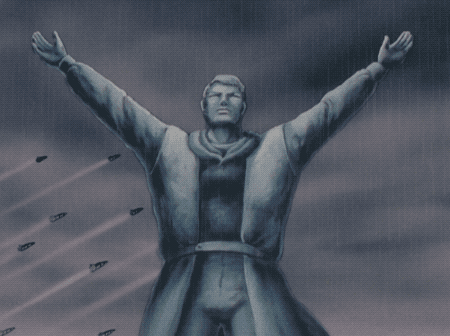
April 797/488. Since Yang saw right through Reinhard’s plan and warned Bucock in advance about the impending coup d’etat, Bucock is able to st—haha no just kidding, Bucock does literally nothing and Reinhard’s plan goes off without a hitch. Whoops. What Yang somehow failed to predict is that the leader of the newly established National Salvation Military Council is none other than Admiral Dwight Greenhill, aka Frederica’s dad. (Hey, we told you LoGH dads suck…) The one useful thing Bucock managed to do was sneak some paperwork through that gives Yang legal authority to quell any hypothetical military coups, so with that in place to ease his conscience Yang mobilizes his fleet toward Heinessen. Meanwhile, Reinhard and Kircheis stand on the bridge of the Brunhilde holding hands for long enough that the other admirals must have felt they were intruding.
The Yang Fleet
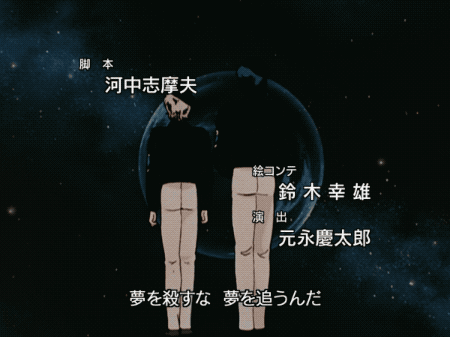
“I can’t imagine the Yang fleet without Lt Greenhill. Just like I can’t imagine the Yang fleet without Rear Admiral Cazellnu or Commodore Schenkopp. Lt Cdr Poplan. Admiral Attenborough. Lt Cdr Konev. Rear Admiral Murai. And so on, many many people. If anyone were missing, it wouldn’t work. Admiral Yang must understand that as well as I do. I know this could be called sentimental, but for me the Yang fleet isn’t simply an organization. Iserlohn is home, and I think a home should hold a family.” —Julian’s Iserlohn Diary, p. 284
In the animation of the season one ED (which incidentally is one of my personal absolute favorite things in the show) we see Yang and Julian moving through the stars as though on some cosmic conveyor belt while other members of the fleet pass by and greet them. We’ve watched this scene over a dozen times by now, playing out behind the closing credits of almost every episode, a whimsical vision of the group that would come to live together on Iserlohn.
...Or is it so whimsical?

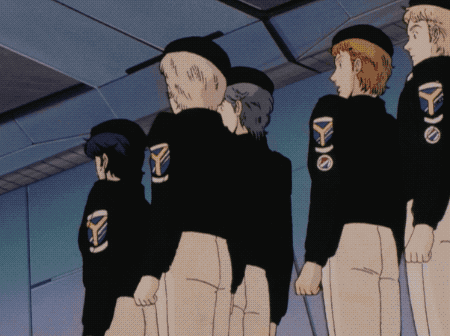
Near the beginning of this episode, set to an instrumental arrangement of the opening theme (the ED itself would have been too on-the-nose, I guess?), the ED animation comes to life on the walkways of Iserlohn: Julian and Yang moving not through the stars but through the fortress, as first Dusty and then Poplan and Konev chat with Julian, under the smile of Frederica and the disapproving glare of Murai. The sequence culminates with the arrival of the Cazellnus, and we have all the clues to know why this is so important: Finally, for the first time, the entire cast of the ED is united on Iserlohn. The family of the Yang fleet is complete.

The Cazellnus
As heralded by this walkway sequence, the focus of this episode is the personalities and relationships that make up the fleet on Iserlohn. So let’s delve a bit into this ragtag cast of characters that Yang’s chosen to assemble, starting with the Cazellnu family.
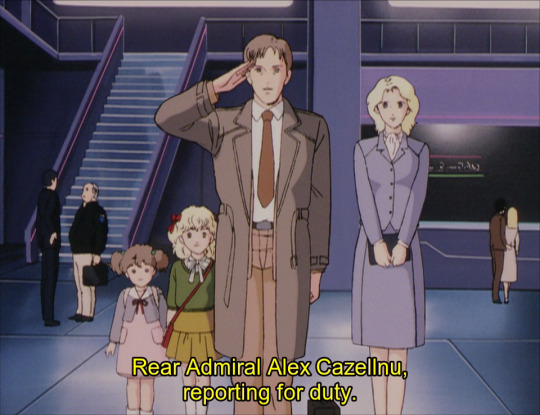
Total screentime for Hortence ticks up from one second to two! This is for our own protection: If you stare at Hortence Cazellnu for more than an instant at a time, you fall under her thrall and your mental faculties are forever compromised. That’s canon* and explains a lot about Cazellnu. *See diary quote below...
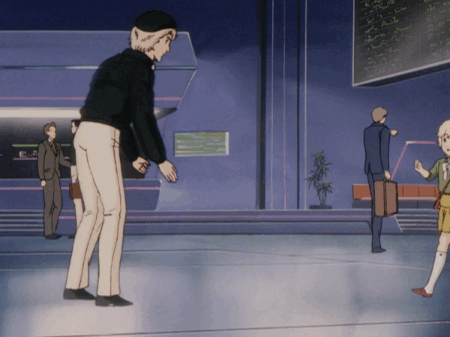
Aww so cute, Julian playing with Charlotte and her little sister the unfathomable hell-demon whose quest to enslave humanity can only be thwarted by discovering and uttering her true name.....
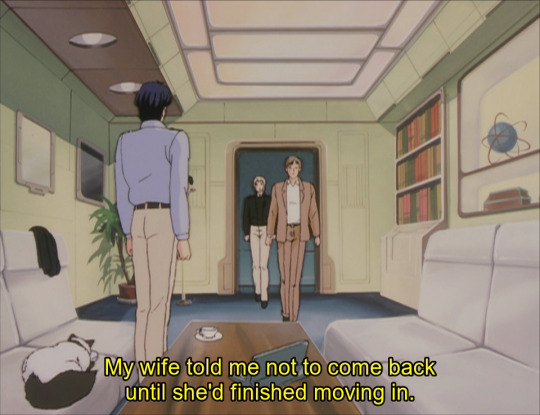
“Yang kindly calls me a ‘master of cleaning and tidying.’ From his level it might seem that way, but from my point of view Mrs. Cazellnu seems like a ‘white witch.’ [...] When I said this in the morning, Yang nodded emphatically. ‘That must be true. She’s a white witch, and her husband is a dark wizard. After he lost a magical duel, he became her servant forever.’” —Julian’s Iserlohn Diary, p. 107
I’ll talk more about Hortence and the dynamics of the Cazellnu family when we do finally get to see her for more than one second at a time; for now let’s focus on Alex Cazellnu himself, whose only real role in this episode is to insult Yang at every opportunity. Ahh the bonds of friendship.
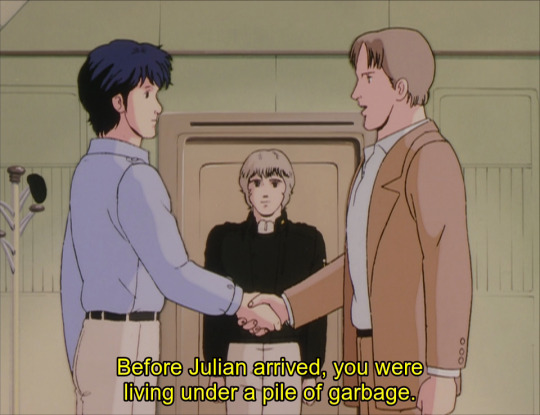

Yang claims to be excited that Cazellnu’s there mainly because he can push mountains of paperwork off onto him—Cazellnu’s official post is as some sort of manager of supplies and personnel; but I imagine that for Yang, who’s been thrust into this position of authority that he never really sought, there’s something comforting about filling his inner circle with people who don’t treat him with reverence. Cazellnu is an old friend who, in some ways, sees Yang more clearly than most people do.

Isn’t there a proverb, “children and fools tell the truth”...?
Schenkopp
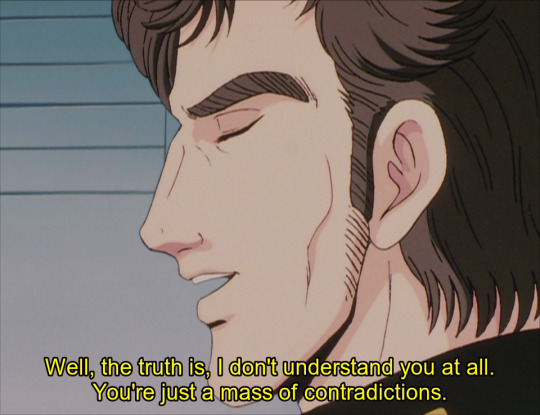
Hey, isn’t that what I said about Yang when I first introduced him? Schenkopp must be reading Icebergs!
Like Cazellnu, Schenkopp has no qualms speaking his mind to Yang; unlike Cazellnu, who sees Yang as more or less an open book, Schenkopp sees him as a puzzle to be solved. He’s appointed himself Yang’s amateur psychoanalyst, and prods him on issues ranging from Frederica’s feelings to his political aspirations (or lack thereof) to his wishes for Julian’s future.
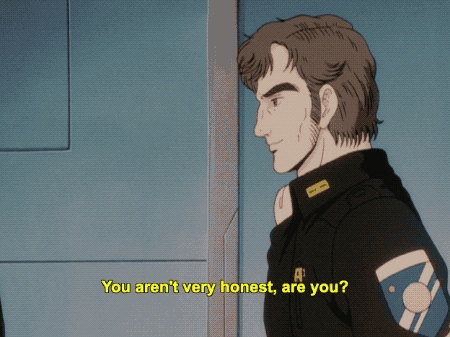
True to form, Yang responds to this implication that Frederica has feelings for him beyond her role as his adjutant by completely ignoring it and deflecting the conversation to how Schenkopp sees him.
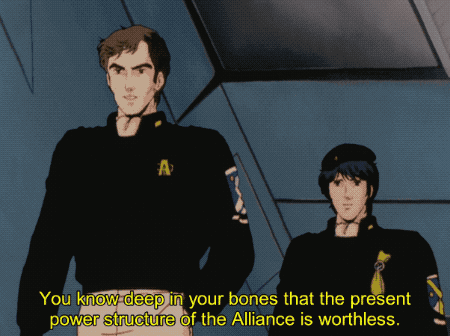
While later on it will be mainly Cazellnu's role to question Yang's decisions about his personal life, it's Schenkopp who questions his political and strategic decisions. Yang's discomfort with the direction of the conversation is very clear on his face.

I've touched briefly before on the fact that Yang is projecting his own feeling of being trapped into the military onto Julian, and that's what Schenkopp is accusing him of here.
Poplan and Konev

“Their personalities seem to be really different, but every time I catch sight of them they’re together, so I guess they’re close.” —Julian’s Iserlohn Diary, p. 20
We only get a brief glimpse of Poplan and Konev in this episode, but there’s a ton of character in this short exchange: from their synchronized body language, to Konev’s affectionate smirk as he watches Poplan talk to Julian, to Konev’s roasting Poplan using syntactical terms that Poplan doesn’t seem to totally understand. (Konev’s wordplay and love of language is a recurring theme of his character and I totally love it.) We’ve observed their closeness already when Konev calms Poplan down during a stressful battle; here we learn that Konev also does not hesitate to teasingly call Poplan out on his bullshit—in this case, attributing to Julian his own desire for action.
Julian
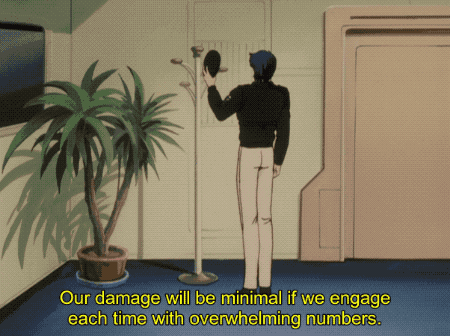
I agree Julian, that is a really great assessment of the strategic situation.
We’ve seen Julian in the role of caretaker, shadow, and aspiring protector; but this is the first time we really see him in the role of protégé. When Julian points out how difficult it will be to quell four rebellions on different planets at once, Yang responds by asking him for his ideas, then taking his suggestion and filling in the holes.

While Yang is obviously acting as the teacher here (and equally obviously enjoying it), he talks to Julian without condescension; even pointing out the flaws of his original suggestion feels like a sign of respect for him as a serious student of tactics.
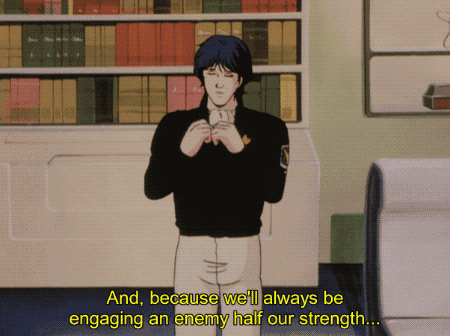
The transition from wide-eyed adulation to a much more serious “why yes indeed that does appear strategically sound” face is amazing.
Of course, despite including Julian as a real participant in a conversation about the upcoming campaign, Yang simultaneously still treats him like a kid, ruffling his hair at the end of this conversation just like he did when Julian promised to protect him two episodes ago.

Like a kid or possibly like a puppy, one or the other.
Also mental note: Do not suggest to Julian that Yang might not actually win an impending battle…

“It pisses me off. Despite flattering him with names like ‘Miracle Yang’ and ‘Yang the Magician,’ when push comes to shove they don’t show faith in him. I was so angry, I almost forgot my crucial errand of buying teabags.” —Julian’s Iserlohn Diary, p. 289
Frederica
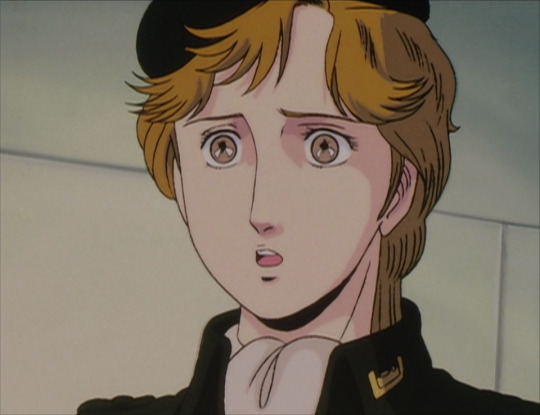
TFW you’ve just learned your dad has forcibly overthrown a democratic government.
It’s a rough episode for Frederica. From what we know she seems pretty close to her dad, and perhaps partly because of that she assumes that his role as leader of the coup will throw suspicion on her loyalty.
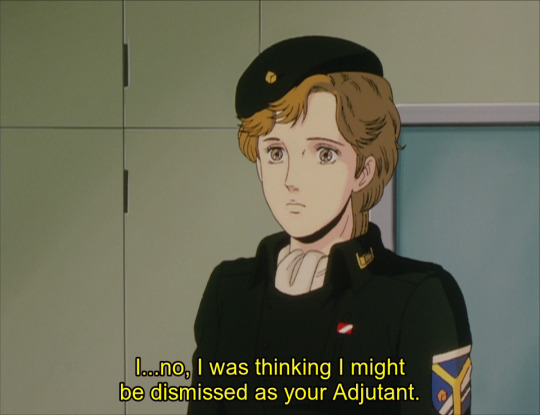
Lost in translation is the fact that she changes her first-person pronoun, correcting her initial watashi to the more formal/humble shoukan (小官), which emphasizes her formal role here as a military subordinate.
Of course, Yang is way too practical to punish someone for something her father is doing (especially someone whose job saves him a hell of a lot of work), and as both Julian and Schenkopp predict he has no intention of firing her.
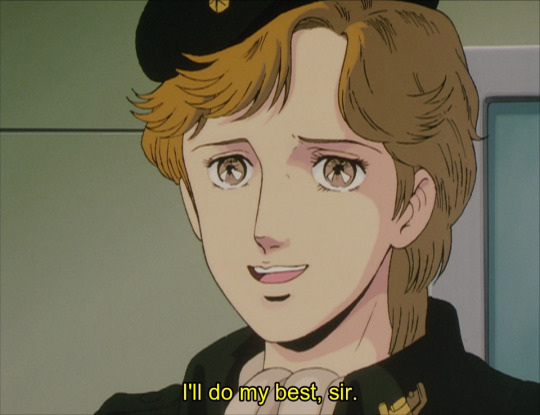
We don’t get to see much inside Frederica’s mind about her reaction to her father’s role in the coup, beyond her initial shock; what we do see is overwhelming relief and happiness when she isn’t fired. Between her father and Yang, it’s clear where her current loyalties lie.
Interestingly, Admiral Greenhill himself gets this wrong: He assumes that Yang will have fired Frederica and confined her on Iserlohn, which is part of his rationalization to himself for sending the 11th fleet to fight Yang—they won’t be attacking Frederica because she won’t be there.

...Whoops.
It seems like a minor detail, but Admiral Greenhill failing to predict Yang’s reaction is actually a really nice touch to emphasize the theme—as expressed by Julian’s diary passage that I opened this post with—that there’s something a bit different and more personal about how Yang runs his fleet.
Stray Tidbits
I hope you’ve enjoyed the exclusive Icebergs sneak peek at Julian’s Iserlohn Diary! As I mentioned, the diary, like the novels, is not officially relevant to our analysis, but I really love that the anime team used it to flesh out the dialogue and characterizations in both episode 17 and this episode—it’s more evidence of just how well they did their homework. (And hey, if you want to read the whole diary in English, write to Haikasoru and tell them you know someone who’d love to translate it for them.....)
I never found Admiral Greenhill especially interesting through the whole season so far, but I really love the closing scene of this episode—somehow it gives me chills every time. Acting to minimize harm in a situation with no good options is a pervasive theme of the show; and as Greenhill tries to explain to his wife’s grave, he believes that if someone more hotheaded and extremist were leading this coup, even more damage would be done. It’s an interesting parallel with Yang’s own motives for staying in the military despite opposing the war.

I love how totally useless Bucock was. LoGH is often quite subversive in its plotting, as we’ve discussed, and the anticlimax of Yang going to great lengths to warn Bucock about the coup in advance only to have that be irrelevant is both hilarious and realistic.
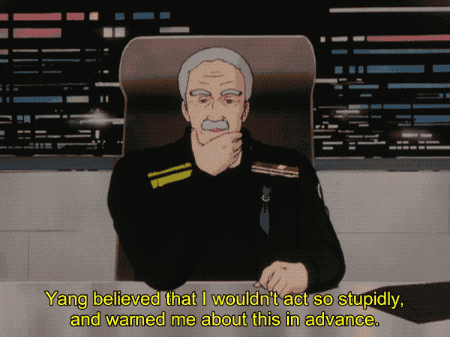
This guy makes a valid point.

Might that “someone” be...an octopus?? Come on Hidive subbers, why the censoring?
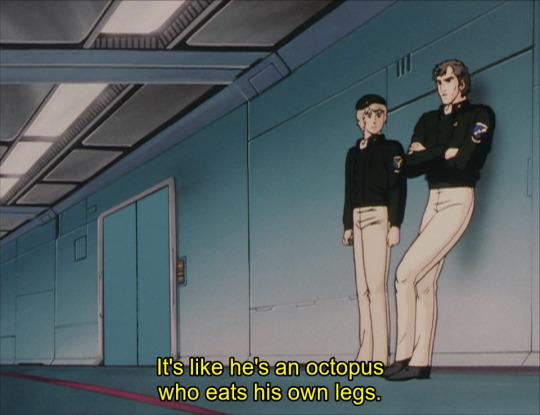

Next time you shake hands in farewell with someone, try just not letting go for exactly seven seconds. And also look at them with exactly Reinhard’s expression here. Do it. Report back.
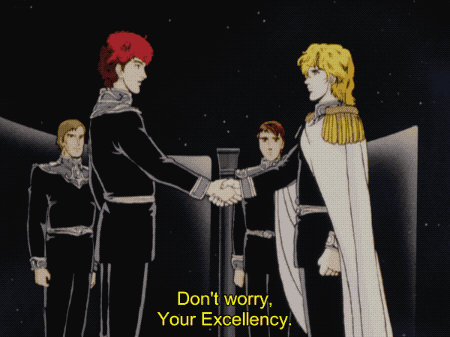
You have been blessed with Beautiful Smirking Schenkopp. He will bring you luck in all of your endeavors today.
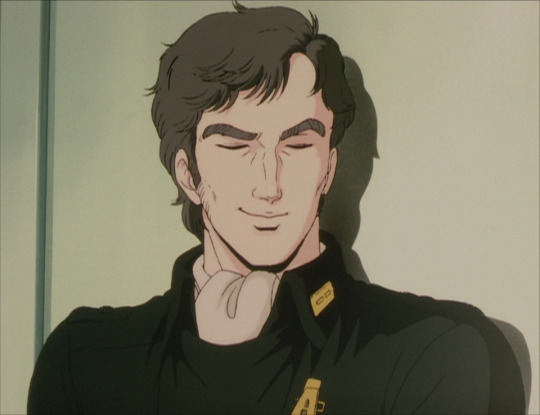
#Legend of Galactic Heroes#Legend of the Galactic Heroes#author: Rebecca#Alliance#Iserlohn#Hortence#Charlotte#unnameable demon child#Cazellnu#Schenkopp#Poplan#Konev#Yang#Julian#Frederica#Julian's Iserlohn Diary#光の橋を越えて
18 notes
·
View notes
Text
Saving it for the seminar
It used to be that my writing was prompted by conversations I had in real life – after openings, after classes, after late night ‘salon’s’ with friends – unfinished conversations I felt compelled to continue in imagination long after my interlocutors were no longer within ear shot. Sometimes these addendums were motivated by the kind of resentment that is all too familiar to those who claim “introversion” as a defense for their fear of speaking up, though more often than not they were more simply motivated by an obsession with the points under discussion, which I felt compelled to parse in private, and after the fact of their provocation. Lately though, I’ve felt less compelled to write (even though I have more time than I ever have had to do so.) I tend to go to fewer openings, fewer exhibitions, fewer parties – and the ‘salons’ I used to attend have dissipated as my closest friends have moved away to seek their fortunes in other cities with a greater concentration of these conversations (we all know which city/ies I’m referring to, right – and that the ‘ies’ is merely added out of politeness?)
But of course that’s not entirely true. I still go to at least as many exhibitions as I always did, if not more. I’ll usually go a few weeks after the opening, sometimes with a friend, other times alone – which is to say – I’m still making the effort to be a ‘good citizen’ – at least where art and the ‘community’ around its production and distribution is concerned. I’m just not as interested in converting each of these experiences into online prose as I was a couple of years ago. There are always exceptions – but for the most part now the urge to write is more often prompted by discussions I witness at a distance online – conversations I used to be more tempted to participate in directly – but that I increasingly find myself trying to slowly back away from as a silent witness – even as I find it difficult to look away (usually when I might be better served and be of more use to others by attending to other things – like my job or my work - both of which of course dovetail with this sometimes pathological attention to other peoples conversations, and are thus easy to rationalize as being served by listening in.) After all – I inevitably care a great deal about the outcomes of these conversations – though my engagement with them tends towards the kind of spectatorship that is probably more familiar to an older generation’s relationship to watching sports on television…which is to say I’m a lurker in these discussions – a wallflower, a watcher, and of course a judge. I often find these discussions laborious, derivative, predictable, tedious, disappointing, deflating…in a word - disincentivizing (which is sort of the same thing that happened to my enthusiasm for digital photography after a year of being deluged with the stuff when I first joined tumblr.) This is why I usually stay out of them. A recent post of a left wing outrage phrase generator by a friend on Facebook nicely summed up what it has felt like watching people I respect habitually lower themselves by taking their place in an online chorus of predictable grievance and countegrievance. Another friend put it best, in calling the online essays that often provoke these discussions – “Like Posts” after another article – “Like Art” which truth be told is what initially prompted me to sit down and write this morning, though having done so now I (predictably) no longer feel the urge to weigh in on it directly. (even though I still can’t help myself from doing so*)
All of this is also reminding me of an anecdote in Marc Fisher’s 2009 book Capitalist Realism, written just a few years before peek Facebook, about a college student who always had his headphones close at hand in class – sometimes on his head without music playing, other times resting on a table nearby with music playing at such a low volume that he could barely hear it. Fisher speculates that this incessant need for distraction – even when it is merely hypothetical and potential – has less to do with the actual experience of being distracted by the object itself – be it music, or as I refer to in the case I mention above – the incessant din of “online community” – which as everyone by now understands is more often than not a contradiction in terms with nevertheless all too real consequences in the real world – like the emergent entity of nihilistic spectatorial voting blocks motivated by little else but a disappointed masculinist desire to see the world burn - than it does with the felt existential need to feel that the “matrix is still there, within reach” – an ontological sickness that no longer only applies to the traditional objects of aesthetic enjoyment, but even and especially to one’s own circle of friends, social contacts, and even political rivals, as well as one’s own “private” experiences, which are all cultivated and maintained as objects of aesthetic consumption/distraction, so as to avoid processing directly what if feels like to live in this world at this moment, in which seemingly everyone is trying as hard as they can to squeeze themselves into the device in the palm of their hand as the world closes in around them. Not just pop (as Fisher maintains) but life itself under capitalism “is experienced not as something which could have impacts upon a public space, but as a retreat into private ‘OedIpod’ consumer bliss, a walling up against the social.” And doesn’t this apply to our politics as well, even as public spaces are now being harnessed once again for the theatrical online staging of our “resistance”? (Isn’t it only a matter of time before Facebook introduces a ‘raised fist’ reaction button?)
All of which again is to say – even though I’m as implicated in all of this as all of us are - I’ve been trying to maintain some distance (as I’m sure we all have) and I’ve been trying to restrain my urge to “weigh in” with a “hot take” on the latest article, video, or outraged sentiment that crosses my news feed, and save it for the seminar, where the stakes feel higher, and the takes hotter (and cooler) than they ever do online...and of course this is an immense privilege, for which I am incredibly thankful. Without it I��m certain I would have written many more things in the heat of the moment that I would live to regret in a year or so.
* my main objection to this essay, as with a similar one by another author writing about the work of Amy Feldman, is that both infer (cynical) intent on the basis of the shortcomings of the distribution apparatus through which the work is encountered. (On the other hand - what I appreciate about both of these articles - aside from their excessive comic vulnerability - and what motivated my own engagement in this sort of writing a few years ago - is that at least they’re willing to take the relationship between the objects and their makers and the site of distribution and reception seriously.) On the flipside of my objection to these authors is my objection to their critics, who seem to want to absolve the artists involved of any responsibility for the way in which their work is distributed and received. In both cases, I think the parties involved are guilty of a kind of bad faith, and one with which I am all too familiar, having succumbed to similar temptations in my own writing about exhibitions on this blog a few years ago. So I understand the resentment a critic feels walking into an exhibition which feels stingy and whose aesthetic decisions feel (though they may not in fact be) overly determined by economic considerations, just as I understand the resentment artists feel when critics hold artists to task for all of capitalism. I’ve been on both sides of this, so I think I get why so many of my friends are either worked up about it, or feel the need to (defensively) demonstrate just how not worked up they are.
0 notes